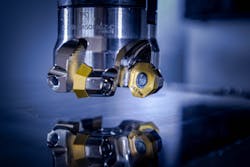Desktop Metal Awarded Multi-Million Dollar DoD Project
Ongoing material and process development are crucial as manufacturers continue to align operations to thrive in the ever-evolving marketplace. Of course, undertaking innovation-based projects is risky without support.
Desktop Metal, a mass production and turnkey additive manufacturing solutions provider, announced today it has been awarded Phase I of a three year $2.45 million dollar project from Department of Defense (DoD) to develop a sophisticated additive manufacturing process capable of mass producing Cobalt-free hardmetals, developed by the U.S. Army.
Desktop Metal’s proprietary production system with single pass jetting (SPJTM) will mass manufacture complex shaped Co-free hardmetal parts without tooling and is expected to lead to the development of a dual use technology with numerous applications in DoD as well as in the civilian sector. This new process has the potential to change the landscape of the carbide hardmetals market which is projected to grow to $24 billion by 2024 and is used in dual use applications including cutting tools, abrasion and chemical resistant nozzles, parts for the oil and gas sector, parts for the chemical and textile industry, tools used in agriculture and mining, steel industry, consumer goods and sporting goods, parts for off-road transportation, aerospace and defense sector, construction, and in tools and dies for chip-less materials forming.
Successful investigations by the U.S. Army in developing a novel iron-based nano material as the matrix in WC-based hardmetals, replacing Cobalt, has resulted in the development of a patented, novel Co-free WC-(Fe-Ni-Zr)-based hardmetals. In tandem with the creation of this promising new material for commercial and DoD applications, the ARL has been in search of a cost-effective, high volume process capable of manufacturing the new Co-free hardmetals into complex, net or near-net shaped parts without the use of any tooling.
“The success in this project will not only provide the hardmetal community with their eagerly desired Co-free hardmetal solution, but also result in the development of a tool-free processing technique capable of fabricating this class of materials into extremely complex shaped parts at speeds that can rival most other high-volume manufacturing techniques, opening up new horizons in the area of hardmetals and its applications,” said, Desktop Metal Vice President of Special Projects Dr. Animesh Bose, and a fellow of ASM International and APMI International.
The goals and requirements of the three-year project include:
- Development of a feedstock and binder system for novel cobalt-free hardmetal;
- Using the Desktop Metal SPJ process to print a sufficient quantity of components of at least 200,000 parts in one day from a single machine; and
- Delivery of a cost analysis for scaling up its advanced SPJ binder jet manufacturing technique to successfully manufacture at least 500,000 prototype pieces.
New outlook for cutting tools?
However, when Desktop Metals overcomes the obstacles, Bose sees some exciting applications, especially within the commercial market. This includes significant potential within cutting tools and a wide array of wear related applications -- both spaces where cobalt currently thrives.
"Within the cutting tool market, tungsten carbide cobalt has been around for more than 90 years, and even though it has known issues (being a strategic material as well as toxicity) it has been a mainstay in the hardmetal industry because it's so good. right," says Bose. "People have been working for at least a decade trying to replace cobalt."
“The novel Co-free hardmetal grade is expected to yield a high strength, high toughness, high hardness, and high wear resistance material,” said Dr. Nicholas Ku, materials engineer, CCDC Army Research Laboratory. “We believe combining this novel material with Desktop Metal’s single pass jetting technology will have major applications not only in the defense sector but also in the commercial sector. Further, we believe this combined method will dramatically improve sustainability, reduce the use of a conflict mineral and provide an environmentally-friendly process to mass produce parts with superior properties.”
“This effort exemplifies the ability of NCMS and AMMP to link cutting edge technologies of non-traditional defense contractors with government agencies to meet existing needs and requirements,” said NCMS CEO Lisa Strama. “We look forward to the lasting impact this initiative will have within AMMP, the Army, and the broader community driving innovative Co-free hardmetal solutions across the services and industry at large.”
About the Author
Peter Fretty
Technology Editor
As a highly experienced journalist, Peter Fretty regularly covers advances in manufacturing, information technology, and software. He has written thousands of feature articles, cover stories, and white papers for an assortment of trade journals, business publications, and consumer magazines.


